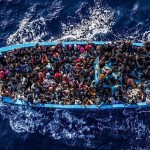Aid in the 21st century is increasingly evidence-driven. Between 2000 and 2006, the World Bank spent a total of $630 million on research. By 2011 the World Bank was spending $606 million per year, or about a quarter of its country budgets. In September of this year, by signing up to the Sustainable Development Goals, the global community enshrined a commitment to “increase significantly” a range of high-quality data over the next 15 years, to facilitate qualitative as well as quantitative understandings of growth and Continue reading →
Rethinking Research: Systemic Approaches to the Ethics and Politics of Knowledge Production in Fragile States
Over the next week, Humanity will be hosting an online symposium on the changing nature of knowledge production in fragile states. In light of the intensification of evidence-based policymaking and the “data revolution” in development, the symposium asks what the ethical and political implications are for qualitative research as a tool of governance. The symposium will begin tomorrow with a short paper from Deval Desai and Rebecca Tapscott, followed by responses during the week from Lisa Denney and Pilar Domingo (ODI); Michael Woolcock (World Bank); Morten Jerven (Norwegian University of Life Sciences and Simon Fraser University); Alex de Continue reading →
Call For Papers: Human Rights Working Paper Series
The Human Rights Working Paper Series (WPS) is dedicated to interdisciplinary and critical dialogue on international human rights law and discourse. It publishes innovative papers of the highest quality by established and early-career researchers and practitioners, from the University of Texas and other institutions around the world. The WPS provides authors with an opportunity to receive feedback on works in progress. It also seeks to provide a lively, productive environment for debate about human rights among academics, policymakers, practitioners, and the wider public. To Continue reading →
CALL FOR APPLICATIONS: GLOBAL HUMANITARIANISM | RESEARCH ACADEMY
International Research Academy on the History of Global Humanitarianism Academy Leaders: Fabian Klose (Leibniz Institute of European History Mainz) Johannes Paulmann (Leibniz Institute of European History Mainz) Andrew Thompson (University of Exeter) in co-operation with the International Committee of the Red Cross (Geneva) and with support by the German Historical Institute London Venues: University of Exeter, UK & Archives of the International Committee of the Red Cross, Geneva Dates: July 10-22, 2016 Deadline: December 31, 2015 Information at: http://hhr.hypotheses.org/ and http://imperialglobalexeter.com/ The international GLOBAL HUMANITARIANISM | RESEARCH Continue reading →
Europe’s Embarrassment
The European Agenda on Migration, published May 13 and implemented throughout the past summer, is a fascinating initiative. The policy has four stated “pillars”: (1) reducing incentives for unauthorized or “irregular” migration; (2) border management — which is understood as both border enforcement and saving the lives of migrants at risk; (3) a “strong common asylum policy” and (4) providing new avenues for legal migration. This agenda presents the EU’s most comprehensive attempt to address a surging number of asylum seekers and migrants now Continue reading →
Between the Sea and the Problem of Humanity: The Mediterranean’s Refugees and the Humanitarian Reason of Rescue at Sea
Rescues at sea are dangerous and come with great possible cost to those involved. In this brief essay, I consider why, beyond a simple explanation of the imperative to protect life, civilian sailors rescue refugees at sea, and explore how specific extreme environments and professional identities may interface at the boundaries of humanitarian imagination, thought and action Before MSF and the navies of EU states became more involved in intercepting boatloads of refugees sinking into the Mediterranean, the job of pulling them out of the Continue reading →
Atrocity Photographs, Dignity, and Human Vulnerability
. . . the dignity of the victims cannot be “given by the photographer” . . . ; it must inhere in their own stoicism or defiance, and it is, in a sense, their gift to us. —John Benthall1 Harrowing images of death, injury, and of people in various states of distress, terror, and vulnerability circulated by humanitarian organizations, memorial museums, and exhibits seek to encourage empathy with disempowered victims. Such images, in the form of amateur snapshots, photojournalism, and art photography of atrocities, are Continue reading → Continue reading →
Albert Hirschman and the Social Sciences: A Memorial Roundtable
Introduction Michele Alacevich Albert O. Hirschman died on December 10, 2012, after a long, eventful, and at times truly adventurous life. Born in 1915 Berlin as Otto Albert Hirschmann, he belonged to the last generation of upper-crust, assimilated Jews in democratic interwar Germany. As a young social democrat, he observed with increasing concern the polarization of the political life in postwar Germany before the collapse of the Weimar Republic. When Adolf Hitler seized power in 1933, seventeen-year-old Hirschman went to Paris and did not return Continue reading →
From Empires to NGOs in the West African Sahel: An Introduction
Gregory Mann’s new book, From Empires to NGOs in the West African Sahel: The Road to Nongovernmentality (Cambridge: Cambridge University Press, 2014), is excerpted here, as a prelude to an interview with the author.* Frantz Fanon was growing angry. It was 1960, and he was deep in Mali, a vast country, “fervent and brutal,” a place where there was “no need of great speeches.” The country had just gained independence from France weeks before, and its new president, Modibo Keita, “ever militant,” had assured him Continue reading → Continue reading →
An Interview with Gregory Mann
The Humanity editorial collective asked Kenneth Harrow and Janet Roitman to join us in posing some questions to Gregory Mann on the publication of his new book From Empire to NGOs in the West African Sahel: The Road to Nongovernmentality (Cambridge, 2015). The transcript of the discussion follows. Humanity: Could you briefly lay out the topic of the book? Gregory Mann: The book asks what “government” has meant in a part of the world where its meaning was particularly dynamic, slippery, and contentious in the period from the 1940s through the Continue reading → Continue reading →

